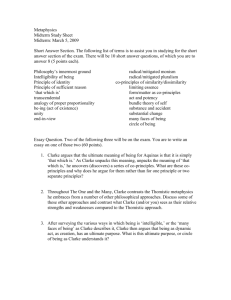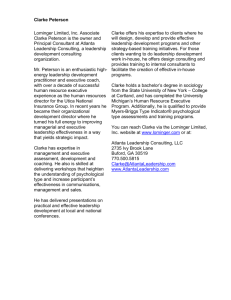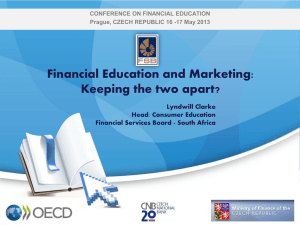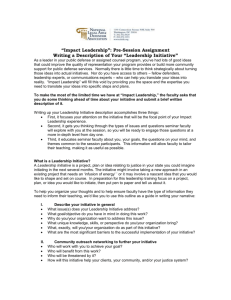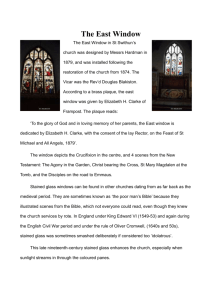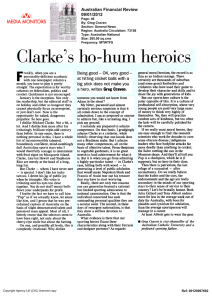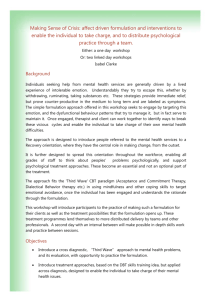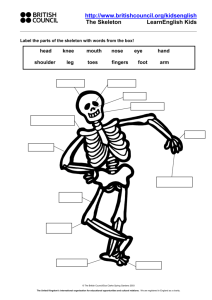Document
advertisement
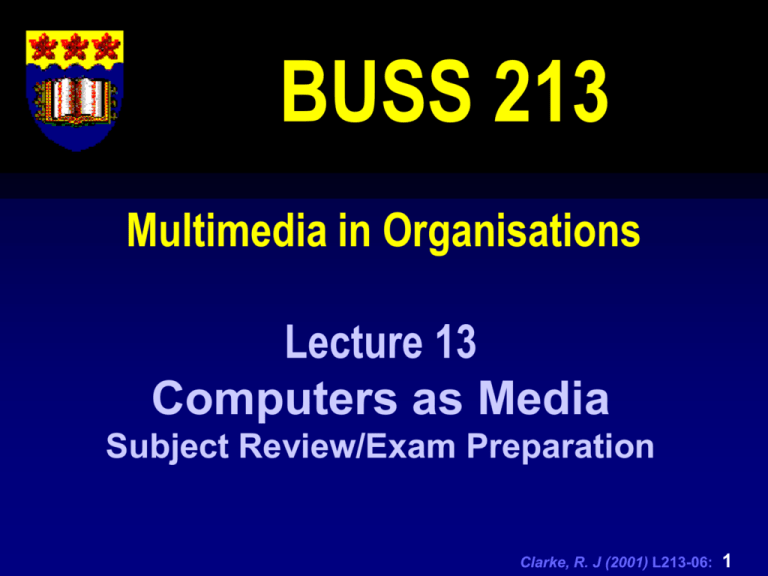
BUSS 213 Multimedia in Organisations Lecture 13 Computers as Media Subject Review/Exam Preparation Clarke, R. J (2001) L213-06: 1 Notices (1) Assignment 2 If you wish to query the mark that you have received for any Assignment please see me at your earliest convenience Make sure you have received an Assignment feed back sheet for BUSS213 Assignment 2 If you have any concerns about your marks then see me today at 2:30 Clarke, R. J (2001) L213-06: 2 Notices (2) Assignment 3 Assignment 3 is due today by the close of business- remember to include all necessary media when submitting your assignment Because of the submission date for this assignment is is absolutely crucial that you check your marks with me prior to walking into your exams they will be posted from the start of the examination period Clarke, R. J (2001) L213-06: 3 Notices (3) Exam Preparation & Lecture Notes the Textbook is an integral part of your preparation for the examination in this subject- if you are keen to start preparing for the examination- them by all means start there I plan to have all lecture notes for this subject on the web by this coming Monday- the start of Study Week … … that process has started already- the subject website now has Lectures 9-13 inclusive this process has already started- I will also still continue to forward printouts to Closed Return Clarke, R. J (2001) L213-06: 4 Agenda (1) Media, Mediation and computers Subject Review and Examination Preparation Clarke, R. J (2001) L213-06: 5 Agenda (2) in the first lecture we said that the major reason new forms of media can be created is that traditional digital media can be transformed from data to processes we will see that ‘new’ media (or digital media) involves adding computation to existing forms of media by adding: Selection- on event do this Repetition- repeat this until that to a specific State for static media or Sequence for Time-ordered media Clarke, R. J (2001) L213-06: 6 Agenda (3) Transforming Traditional into New Media transforming traditional media into new digital media can occur to even the most basic of media types- for example the use of computation to transform text into dimensional typography we will illustrate that sequence, selection and repetition can work to create entirely new kinds of media (we consider Time Slice Imagery and QuickTime Virtual Reality) Clarke, R. J (2001) L213-06: 7 Agenda (4) Creating New Media there are many forms of new digital media which are currently being created- many simply await an application for which they are suited this was in fact the case for Time Slice Imaging when it was first described in a Scientific American magazine if we can understand and define media we may be able to create entirely new kinds of passive and interactive experience for users! we can demonstrate how this is possible by proposing a variation on Time Slice Imagery which we will call Space Time Imaging (STI) Clarke, R. J (2001) L213-06: 8 Computers as Media this entire course has been about organisational multimedia- what this might mean, how can it be analysed, designed and built, how can it be used, for whom and why we have reluctantly abandoned the established theory provided to us from education which thinks of the development and use of software in psychological terms why because organisations are social it works out that you cannot bridge these two worlds- so I pick the social as I cannot look inside someone's head! Clarke, R. J (2001) L213-06: 9 Computers as Media We cannot rely on established information systems theory because it is inappropriate as well It has in most cases already been based on psychological based theories (Card & Moran et)- so we are left with this frightening and challenging path develop something new- make it socialand make it relevant to organisations one paradigm which might be useful is to consider the computer as media Clarke, R. J (2001) L213-06: 10 Computers as Media there are probably three uses of the term media (Williams 1988) 1. an old sense of intervening or intermediate agency depends on particular philosophical ideas where there had to be a substance intermediate between a sense or a thought or its operation or expression this idea of medium has been dispensed with so that language for example is seen as primary practice for writing (print) Clarke, R. J (2001) L213-06: 11 Computers as Media 2. a technical sense which distinguishes between print, sound vision as media is seen as its own particular kind of thing, but is in practice compatible with a social sense of media in which the practices and institutions are seen as agencies for quite other than their primary purposes 3. an industrial sense- newspapers or broadcast services seen as medium for something else like advertising Clarke, R. J (2001) L213-06: 12 Subject Review Clarke, R. J (2001) L213-06: 13 Subject Review We have covered a wide range of topics and in some cases these topics have been covered in considerable depth reflecting our interests in development Broadly speaking, I have also taken the view that traditional theoretical approaches to multimedia- especially in the form of psychologically motivated HCI theory- are inappropriate for organisations at best- flawed at worst Clarke, R. J (2001) L213-06: 14 Subject Review I have also been personally inspired by related research work in Scandinavia especially in Denmark and Sweden which is very different to the typical presentations of the field coming from North America the former emphasises the way in which multimedia is media and concerns itself while the latter emphasises the technology Clarke, R. J (2001) L213-06: 15 Subject Review this subject was designed with the following structure Constituent Types of Media (Lectures 3-6) Text & Related Technologies Images, Graphics, Animation Temporal Media- Sound and Video Creating New Media Designing Interfaces and Modelling Applications (Lectures 7 & 8) Interaction, Interactivity and Organisational Use (Lectures 9 & 10) Delivery Approaches, Production & Evolution (Lectures 11 & L12) Clarke, R. J (2001) L213-06: 16 Subject Review Your review of material for the examination should be motivated by this curriculum design Which means you need to consider the following parts Clarke, R. J (2001) L213-06: 17 Examination Preparation Clarke, R. J (2001) L213-06: 18 Examination Preparation Format Time Allowed: Two (2) Hours + 15 Minutes Reading Number of Questions: Part I: 40 Multiple Choice Questions- One (1) Mark each Part 2: 7 Short Answer Questions- Five (5) marks each Directions to Candidates: All questions should be attempted. In the case of multiple choice questions, candidates should select the most correct option. This exam contributes 50% towards your final mark. Examination Materials Allowed: English and Foreign Language translation dictionaries only Clarke, R. J (2001) L213-06: 19 Examination Preparation Approach- Multiple Choice Questions Although a substantial amount of the examination as multiple choice- do not think they will be easy! I have made sure that almost every question has no stupid options that can be removed as being too ludicrous to be considered- there are also 5 options not 4 as is the practice in some multiple choice examinations Answer everything!- but guessing would be nearly pointless- there is no magic pattern to the answers! Clarke, R. J (2001) L213-06: 20 Examination Preparation Approach- Short Answer Questions the short answer questions are meant to be short (do not exceed more that 1 page)- use diagrams, use point form Advice from an old hand- make sure that you figure out how long you should spend on each question Give yourself only that much time- when the time is up move to the next question if you have time at the end go and complete any incomplete answers. In this type of multi-section examination when you are doing different types of responses- timing is crucial! Answer everything!- but don’t waffle! Clarke, R. J (2001) L213-06: 21 Examination Preparation Examinable Material Examinable material: Material covered in Lectures Material covered in the Textbook (yes really- in fact I have been constantly reminding you to refer back to your textbook in order to get more basic information) Clarke, R. J (2001) L213-06: 22 Examination Preparation Non-examinable Material Non-examinable material: Includes any development related material (you have done enough of that already). Specifically what I mean is you will not need to implement anything under examination conditions. Neither are you expected to develop storyboards Clarke, R. J (2001) L213-06: 23 Examination Preparation Subject Review 1. Constituent Types of Media (Lectures 3-6) Text & Related Technologies Images, Graphics, Animation Temporal Media- Sound and Video Creating New Media 2. Designing Interfaces and Modelling Applications (Lectures 7 & 8) 3. Interaction, Interactivity and Organisational Use (Lectures 9 & 10) 4. Delivery Approaches, Production & Evolution (Lectures 11 & L12) Clarke, R. J (2001) L213-06: 24 Examination Preparation Subject Review (1) Constituent Types of Media Different types of text, graphics, animation, sound and video As well as their definition and characteristics Workflows associated with different types of media New media Clarke, R. J (2001) L213-06: 25 Examination Preparation Subject Review (2) Designing Interfaces and Modelling Applications Interface design theory and design process Object-orientation in multimedia development in general Clarke, R. J (2001) L213-06: 26 Examination Preparation Subject Review (3) Interaction, Interactivity and Organisational Use Different types of multimedia systems relevant to the concerns of this course Organisationally relevant theories of user interaction Communication in organisations and development Clarke, R. J (2001) L213-06: 27 Examination Preparation Subject Review (4) Delivery Approaches, Production & Evolution Conventional, Internet and Hybrid based modes of delivery Expect you to understand in detail different types of production workflows Development Processes in detail Clarke, R. J (2001) L213-06: 28 Closing Remarks I would like to say that I have been very proud to develop this course and I am proud of the way that you as a group have tackled the material and attempted in many cases to do the best you can I hope that you carry away from this course some useful ideas- I hope that some of you get employment in this part of Information Systems I find this type of information systems work fascinating- not because it gives immediate benefits- because it doesn’t- but because it’s a perfect blend of technology and art GOOD LUCK and THANKS! Clarke, R. J (2001) L213-06: 29
